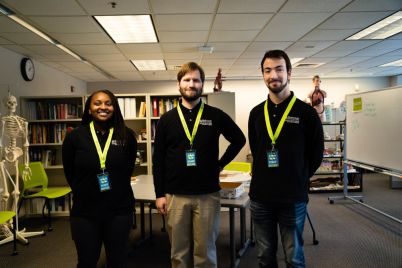
Julie Kissel, WCCEA president and faculty member, oversaw negotiations for a new contract that went into effect August 23.
President Rose Bellanca received a new contract by unanimous vote that will extend through August 2025.
After a month of negotiations, the Washtenaw Community College Education Association settled on a bargaining agreement that took effect Aug. 23 and extends to August 2025. The contract, which has 98% approval from WCCEA membership, was unanimously approved by the board of trustees on July 19. Julie Kissel, faculty member and president of the WCCEA, was satisfied with the outcome. In an email Kissel said,
“Any contract work is dynamic. I can say that our effort was to be sure our contract represents and supports how we all do our jobs, and we feel like we succeeded in that effort.”
Among the benefits secured in the negotiation is a wage increase of 3% in 2022, 2% in 2023, and 2% in 2024.
A full-time instructor at WCC can earn anywhere from $62,849 to $107,539 per year depending on years of experience and education. An instructor is placed in a “step,” ranging from 16-30. The low end represents the minimum entry salary, while the high end is based on years of full-time teaching experience with the college, as well as additional education or certifications.
Most instructors are hired at step 22 because of their credentials, Kissel said. Step 22 will come with a salary of $82,001 in the 2022-2023 school year. Human Resources applies a formula to designate step placement.
WCC instructors are some of the highest paid in Michigan, edging out other schools such as Macomb Community College, which has the largest enrollment in the state, and beating out Henry Ford, where an instructor with a master’s degree needs at least five years of experience to earn $61,458 per year.
WCC enjoys salaries well above the national average. According to Ziprecruiter.com, the average salary for a community college professor in the United States is $45,754 per year. The site is an online employment marketplace and gathers data from job postings and third-party sources.
Adjunct instructors separately negotiated compensation in the amount of $992 per contact hour. A three credit course is equal to three contact hours.

WCC’s pay schedule begins at step 16. Henry Ford breaks up salaries into education levels (less than master’s,master’s, doctorate, etc.) for each step with the top end requiring a doctorate. WCC and Macomb use multiple factors, including awarded degrees, earned credit listed on transcripts, experience, certificates, and licenses to determine step placement.
President Bellanca receives new contract
President Rose Bellanca received a contract extension that’s in effect until 2025. Bellanca is set to make $249,000 per year, which, according to community college daily, is above the national median of $241,727.
This seems to be on par with some of her peers, as James Sawyer, president of Macomb Community College is scheduled to make $249,350.
Bellanca’s extension was the result of a unanimous vote by board members, who cited some of her accomplishments as the reason behind their support.
Board member Richard Landau was impressed by Bellanca’s anticipation of the need for a tech upgrade and her handling of the transition to virtual learning during the pandemic. In an email, Landau said,
“…she anticipated the need for vastly upgraded IT infrastructure by onboarding Ellucian (a higher education software company) in 2019. Without this enhanced IT capability, I’m not sure how we would have been able to make the transition to virtual as seamlessly as we did.”
Bellanca’s other accomplishments include opening and expanding an automotive cybersecurity lab, continued workforce development with a STEAM (science, technology, engineering, art, math) focus, passage of two millage ballot proposals, and the $13.5 million renovation of the Morris Lawrence building.
Instructors return to campus
Also discussed in the negotiations was the return to campus. This semester offers more in-person classes and faculty members are ready to come back after two years of teaching from home, according to Kissel.
“Faculty are happy to be teaching and working at home or on campus. They appreciate the flexibility we’ve made clear in the contract to be on campus if needed or teach/advise remotely. We all realize that there is an opportunity to continue to rethink how we teach and determine what course might be best on campus/in person versus online.”
Dave Waskin, a journalism instructor and WCCEA member who voted in favor of the new contract is ready to return to campus. In an email, Waskin said,
“I’m looking forward to it; after two years off campus I’m happy for the change in routine.”
Waskin was also pleased with the changes made in regards to office hours. With this new contract, instructors can have some virtual office hours, as opposed to five mandatory on-campus hours. This is favorable for those that teach both on-campus and virtual classes.
Definitions for online learning were fine-tuned with “virtual” learning being added, as it didn’t exist in the last contract.

